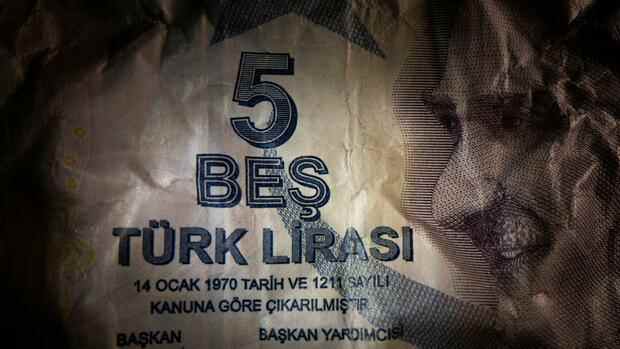The currency has come under further pressure in the past few months.
(Photo: Reuters)
Istanbul Inflation in Turkey continues to rise. In October, national consumer prices rose by 19.89 percent compared to the same month last year, as the statistics office announced on Wednesday. In the previous month, the inflation rate was 19.58 percent.
However, observers had expected even higher inflation. 20 analysts surveyed by the Bloomberg news agency forecast an average price increase of 20.35 percent.
Current data could suggest that the inflation cycle in Turkey is coming to an end and that future prices will rise less. That would not put any further strain on the already overheated Turkish economy. But the government of Head of State Recep Tayyip Erdogan wants to lower key interest rates instead, in order to fuel the economy even more.
The annual price increases for food, which make up about a quarter of the consumer basket, were 27.41 percent in October. In the energy sector, prices rose by 25.76 percent. Core inflation, which measures prices excluding volatile goods like food and energy, fell slightly to 16.82 percent
Top jobs of the day
Find the best jobs now and
be notified by email.
The Turkish lira then lost value slightly. At noon it was 9.6720 lira against the US dollar (record low of 9.8554 lira). Against the euro, the Turkish currency fell to a new low of 11.2570 lira.
The rise in prices and the depreciation of the lira have been causing headaches for investors for a long time. The national currency of Turkey has come under considerable pressure against the dollar and the euro in the past few months and has fallen to record lows in each case.
Central bank cuts the key rate
The situation is exacerbated by the loose monetary policy of the central bank, which recently lowered its key interest rate twice despite the rise in inflation. The key interest rate in Turkey is currently 16 percent. The real interest rate is thus minus 3.89 percent.
Critics complain that the course is significantly influenced by Erdogan, who is considered a declared opponent of high interest rates. Erdogan has repeatedly changed the top of the central bank. With its unorthodox monetary policy, it is pursuing a concrete plan. The low key interest rates are intended to encourage entrepreneurs and consumers to spend their money before it continues to lose value – a step that other emerging countries such as Mexico, China, India, South Korea and Taiwan have also taken to boost their own economic growth.
The ulterior motive: low interest rates ensure that a lot is invested and consumed with credit. Economic growth increases, as does employment in most cases. Both effects can be observed in Turkey: the World Bank, IMF and other organizations have raised their growth forecasts for the country over the summer while the lira had plummeted. Unemployment has also fallen by three percentage points compared to summer.
Another effect: Turkish products are cheaper abroad. That is good for the exporters on the Bosporus – and bad for the competition abroad, which can hardly keep up with the low prices from Turkey. This applies to export products such as auto parts, raw materials such as cotton and fruit and vegetables, but also services such as tourism. In October, the country’s exports rose by more than 20 percent compared to the same month last year. Even on a twelve-month average, exports climbed to a record high.
Erdogan’s bill could – as with most other emerging countries – work out. The problem is: Erdogan himself. His domestic and foreign policy scares off investors, investors and tourists. Ultimately, the lira does not give in when the economy stutters – but when Erdogan takes political steps.
More: The Turkish economy is growing – and that is exactly the risk
